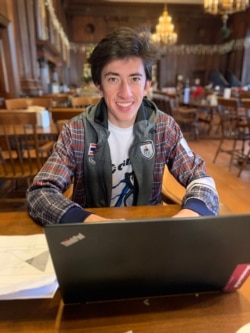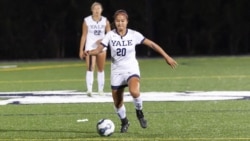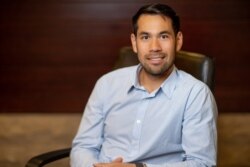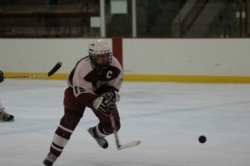Student Union
Asian Student Athletes in US Call for Greater Diversity
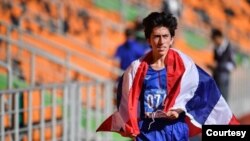
Traditional thinking about college sports does not usually conjure images of Asian athletes, which Asian students say is hindering diversity on the playing field.
"I know when I was younger, looking at some of the really successful Ivy League runners, none of them were Asian American," said Kieran Tuntivate, a Thai American runner and recent graduate of Harvard University. "So, there wasn't really a person I could see myself becoming or model myself after."
Tuntivate, 23, said he believes a lack of role models for young Asian American athletes leads to a loss of diversity.
"I think whatever barriers there are, are in terms of representation," he said.
Tuntivate said other barriers also exist, like assumptions that Asian American college athletes are not committed to athletics or that they might sacrifice athletics for academics.
He broke the 4-minute mile in February 2020, the first ever at Harvard University, and held a grade-point average between 3.6 and 3.7 on a scale where 4.0 is the highest.
His successful track career made local and international headlines, as he balanced athleticism with stellar academics.
Ivy League universities like Harvard do not offer athletic scholarships. Instead, most of the Ivies — a nickname for U.S. colleges and universities that are well-established and highly competitive — offer needs-based admission that awards financial aid to those who have been accepted on merit.
Also, coaches may lend their support to applicants, according to the Ivy League's official website. Ivy League colleges base admissions decisions on academic achievements, as well as personal strengths and accomplishments, which can include athletic abilities, the website states.
Tuntivate said he knows most of the few Asian American Ivy League track athletes. He points to his friend Allen Siegler, a half-Thai runner at Yale University, who he said he feels an "inherent kinship."
"We don't really talk about it much, but I think there is a sort of kinship that we inherently feel, as we're both Asian American and both actually half-Thai. There aren't many people like us in the sport," Tuntivate said.
The National Collegiate Athletic Association (NCAA), which represents college athletes nationwide, compiles statistics on athletic diversity across its three divisions, each of which represent different policies held by institutions toward college athletics.
Across the NCAA's three divisions, 2% of student athletes identified as Asian, Native Hawaiian or Pacific Islander out of 498,691 athletes, compared with 64% white, according to the NCAA.
Diversity varies by school, sport
Diversity in college sports is an issue beyond Asian Americans and the Ivy League, said 21-year-old Kristen Enriquez, the incoming captain of Yale University's soccer team, who is Filipina American.
The discussion about diversity is a "larger" issue that should expand to include other ethnic minorities, Enriquez said.
"When you don't necessarily see yourself represented at a high level, growing up, you kind of question, 'Why is that?'" she said.
Of the 498,691 student athletes in the NCAA, 34% are white males, 11% Black males, 11% "other" males, while 30% are white females, 5% Black females and 9% "other."
The website of the Ivy League Council of Presidents notes that an "expanded commitment" to diversity and inclusion are a core value of all eight Ivy League schools. They did not respond to a request for comment on this story.
There has been forward movement.
In 2018, Victoria Chun was named Yale's director of athletics, the first Asian American and first woman appointed to the position. She is also the first Asian American woman in that role at all the NCAA's 353 Division I schools.
Shortly after she started her position, Chun noted that Yale's athletics department will seek and support a "wide variety of talents, ethnicities, backgrounds and experiences" and that such diversity will make the department "stronger."
Enriquez said it was "empowering" to see Chun's appointment.
"It definitely helps, seeing an Asian American woman as our director of athletics," said Enriquez.
Yale athletics has done a "great job" discussing diversity both within Enriquez's team and in the department. That focus ramped up after the death of George Floyd in May, she said.
Yale's athletics department has celebrated diversity and combated racism at this time. Enriquez credited Chun for leading that effort.
Prejudice and perception
Chris Downer, a 2011 Dartmouth College graduate, played hockey throughout New England and in Canada, both for his high school and just prior to college. Now 31, he recalled several occasions where other hockey players commented about him looking Asian. Downer is half-Chinese and half-American.
"We looked pretty Asian with a helmet on," said Downer. "People would make comments" about his appearance.
Downer co-captained Dartmouth's rugby team, where he said the team was more diverse. He described the team as "very diverse" and a "melting pot," where he did not feel as if he was the lone minority or lone Asian on the field.
Regarding a perception that some Asian parents, families or cultures favor academic performance over athletic development, Tuntivate, Enriquez and Downer said that was not their experience.
Tuntivate said his Thai father has been the most supportive person in his career as he chased his athletic goals. His coach was also behind him, he said.
"He's traveled to almost all my college meets. He bikes with me, as well, when I'm running so I have company, because a lot of long-distance running can get pretty lonely," Tuntivate said.
Enriquez's parents have supported her financially and emotionally throughout her soccer career, she said, and she remains "very grateful" for their belief in her. Her family was "extremely supportive" of the difficult decision to skip an academic semester to focus on her role as team captain, after COVID-19 upended competition schedules in 2020.
Downer said his parents were "really flexible" and "really understood" his passion for sports but made sure to balance that with his academic work.
At the Ivy League, "you're surrounded by some incredibly smart, incredibly motivated people in the classroom, and you can play a sport at the highest collegiate level," said Downer. "It's a great way for people to aspire to have both — great academics, great athletics."
See all News Updates of the Day
- By VOA News
Competition grows for international students eyeing Yale

It’s tough to gain admission to Yale University, and it’s getting even tougher for international students as standout students from around the world set their sights on Yale.
The Yale Dale News, the campus newspaper, takes a look at the situation here.
- By VOA News
Student from Ethiopia says Whitman College culture made it easy to settle in

Ruth Chane, a computer science major from Ethiopia, writes about her experiences settling into student life at Whitman College in the U.S. state of Washington.
"The community at Whitman College made sure I felt welcomed even before I stepped foot on campus," she says.
- By VOA News
Claremont Colleges student gets a shock when she heads home to Shanghai

In The Student Life, the student newspaper for the Claremont Colleges, a consortium of five liberal art colleges and two graduate schools in Claremont, California, student Rochelle Lu writes about readjusting to her Shanghai home after spending a semester in the United States.
- By VOA News
Cedarville University aims to ease transition for international students

Cedarville University in the U.S. state of Ohio says it’s got more than 140 international students representing 44 countries.
Here, the school interviews Jonathan Sutton, director of international student services. He talks about his job and the opportunities for international students on campus.
- By VOA News
Morehouse College offers prospective students tips on applying and thriving

Morehouse College, a private, historically Black liberal arts college in the U.S. state of Georgia, offers a guide for international students interested in attending the school.
Among the tips to apply and thrive at Morehouse:
- Take advantage of the school’s orientation program
- Turn to the school’s Center for Academic Success for tutoring, support and more
- Immerse yourself in campus life via clubs and societies
- By Reuters
US reviews Columbia University contracts, grants over antisemitism allegations

The administration of President Donald Trump said on Monday it will review Columbia University's federal contracts and grants over allegations of antisemitism, which it says the educational institution has shown inaction in tackling.
Rights advocates note rising antisemitism, Islamophobia and anti-Arab bias since U.S. ally Israel's devastating military assault on Gaza began after Palestinian Hamas militants' deadly October 2023 attack.
The Justice Department said a month ago it formed a task force to fight antisemitism. The U.S. Departments of Health and Education and the General Services Administration jointly made the review announcement on Monday.
"The Federal Government's Task Force to Combat Anti-Semitism is considering Stop Work Orders for $51.4 million in contracts between Columbia University and the Federal Government," the joint statement said.
The agencies said no contracting actions had been taken yet.
"The task force will also conduct a comprehensive review of the more than $5 billion in federal grant commitments to Columbia University."
The agencies did not respond to requests for comment on whether there were similar reviews over allegations of Islamophobia and anti-Arab bias.
Columbia had no immediate comment. It previously said it made efforts to tackle antisemitism.
College protests
Trump has signed an executive order to combat antisemitism and pledged to deport non-citizen college students and others who took part in pro-Palestinian protests.
Columbia was at the center of college protests in which demonstrators demanded an end to U.S. support for Israel due to the humanitarian crisis caused by Israel's assault on Gaza. There were allegations of antisemitism and Islamophobia in protests and counter-protests.
During last summer's demonstrations around the country, classes were canceled, some university administrators resigned and student protesters were suspended and arrested.
While the intensity of protests has decreased in recent months, there were some demonstrations last week in New York after the expulsion of two students at Columbia University-affiliated Barnard College and after New York Governor Kathy Hochul ordered the removal of a Palestinian studies job listing at Hunter College.
A third student at Barnard College has since been expelled, this one related to the occupation of the Hamilton Hall building at Columbia last year.
Canada’s immigration overhaul signals global shift in student migration
From Europe to North America, nations are tightening their immigration policies. Now Canada, long seen as one of the world's most welcoming nations, has introduced sweeping changes affecting international students. The reforms highlight a growing global trend toward more restrictive immigration policies. Arzouma Kompaore reports from Calgary.
Trump administration opens antisemitism inquiries at 5 colleges, including Columbia and Berkeley

The Trump administration is opening new investigations into allegations of antisemitism at five U.S. universities including Columbia and the University of California, Berkeley, the Education Department announced Monday.
It's part of President Donald Trump's promise to take a tougher stance against campus antisemitism and deal out harsher penalties than the Biden administration, which settled a flurry of cases with universities in its final weeks. It comes the same day the Justice Department announced a new task force to root out antisemitism on college campuses.
In an order signed last week, Trump called for aggressive action to fight anti-Jewish bias on campuses, including the deportation of foreign students who have participated in pro-Palestinian protests.
Along with Columbia and Berkeley, the department is now investigating the University of Minnesota, Northwestern University and Portland State University. The cases were opened using the department's power to launch its own civil rights reviews, unlike the majority of investigations, which stem from complaints.
Messages seeking comment were left with all five universities.
A statement from the Education Department criticized colleges for tolerating antisemitism after Hamas' Oct. 7, 2023, attack on Israel and a wave of pro-Palestinian protests that followed. It also criticized the Biden administration for negotiating "toothless" resolutions that failed to hold schools accountable.
"Today, the Department is putting universities, colleges, and K-12 schools on notice: this administration will not tolerate continued institutional indifference to the wellbeing of Jewish students on American campuses," said Craig Trainor, the agency's acting assistant secretary for civil rights.
The department didn't provide details about the inquiries or how it decided which schools are being targeted. Presidents of Columbia and Northwestern were among those called to testify on Capitol Hill last year as Republicans sought accountability for allegations of antisemitism. The hearings contributed to the resignation of multiple university presidents, including Columbia's Minouche Shafik.
An October report from House Republicans accused Columbia of failing to punish pro-Palestinian students who took over a campus building, and it called Northwestern's negotiations with student protesters a "stunning capitulation."
House Republicans applauded the new investigations. Representative Tim Walberg, chair of the Education and Workforce Committee, said he was "glad that we finally have an administration who is taking action to protect Jewish students."
Trump's order also calls for a full review of antisemitism complaints filed with the Education Department since Oct. 7, 2023, including pending and resolved cases from the Biden administration. It encourages the Justice Department to take action to enforce civil rights laws.
Last week's order drew backlash from civil rights groups who said it violated First Amendment rights that protect political speech.
The new task force announced Monday includes the Justice and Education departments along with Health and Human Services.
"The Department takes seriously our responsibility to eradicate this hatred wherever it is found," said Leo Terrell, assistant attorney general for civil rights. "The Task Force to Combat Anti-Semitism is the first step in giving life to President Trump's renewed commitment to ending anti-Semitism in our schools."
- By VOA News
STEM, business top subjects for international students

The Times of India breaks down the most popular subjects for international students to study in the U.S.
STEM and business lead the pack. Read the full story here. (January 2025)
- By VOA News
Safety and visa difficulties among misconceptions about US colleges

U.S. News & World report addresses some of the misconceptions about U.S. colleges and universities, including the difficulty of getting a visa.
Read the full story here. (January 2025)
- By VOA News
Work opportunities help draw international students to US schools

US News & World Report details the three top factors in foreign students' decision to study in the U.S. They include research opportunities and the reputation of U.S. degrees. Read the full story here. (December 2024)
- By VOA News
British student talks about her culture shock in Ohio

A British student who did a year abroad at Bowling Green State University in Ohio talks about adjusting to life in America in a TikTok video, Newsweek magazine reports.
Among the biggest surprises? Portion sizes, jaywalking laws and dorm room beds.
Read the full story here. (December 2024)
- By VOA News
Harvard's Chan School tells international students what to expect

Harvard's T.H. Chan School of Public Health reaches out to international students by detailing the international student experience at the school.
Learn more about housing, life in Boston and more here.
- By Reuters
China unveils plan to build 'strong education nation' by 2035

China issued its first national action plan to build a "strong education nation" by 2035, which it said would help coordinate its education development, improve efficiencies in innovation and build a "strong country."
The plan, issued Sunday by the Communist Party's central committee and the State Council, aims to establish a "high quality education system" with accessibility and quality "among the best in the world."
The announcement was made after data on Friday showed China's population fell for a third consecutive year in 2024, with the number of deaths outpacing a slight increase in births, and experts cautioning that the downturn will worsen in the coming years.
High childcare and education costs have been a key factor for many young Chinese opting out of having children, at a time when many face uncertainty over their job prospects amid sluggish economic growth.
"By 2035, an education power will be built," the official Xinhua news agency said, adding that China would explore gradually expanding the scope of free education, increase "high-quality" undergraduate enrolment, expand postgraduate education, and raise the proportion of doctoral students.
The plan aims to promote "healthy growth and all-round development of students," making sure primary and secondary school students have at least two hours of physical activity daily, to effectively control the myopia, or nearsightedness, and obesity rates.
"Popularizing" mental health education and establishing a national student mental health monitoring and early warning system would also be implemented, it said.
It also aims to narrow the gap between urban and rural areas to improve the operating conditions of small-scale rural schools and improve the care system for children with disabilities and those belonging to agricultural migrant populations.
The plan also aims to steadily increase the supply of kindergarten places and the accessibility of preschool education.
- By VOA News
A look at financial aid options for international graduate students in US

The Open Notebook, a site focusing on educating journalists who cover science, has complied a list of U.S. graduate program financial aid information for international students.




